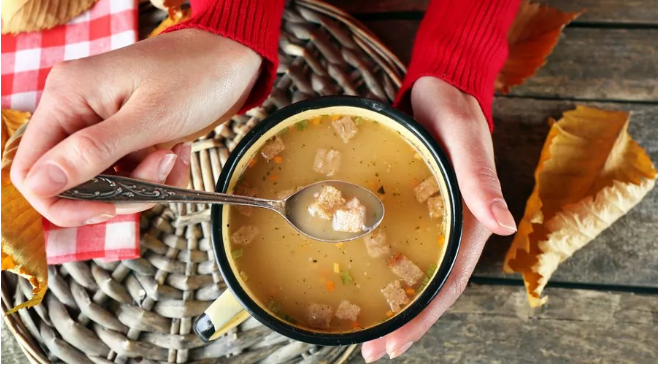Since ancient times, Chinese people like to eat soup as a highly nutritious food.
It is better to eat meat than to drink soup. The longer it is cooked, the higher the nutrition of the soup, which has become a [legend] on the dining table.
As the apple of the family’s eye, the babies naturally have to drink bowls of soup and water.
But in fact, soup does not have what’s magical nutritional effect for children, but drinking too much is not good.
The [nutrient density] of soup water is extremely low.

If you want your baby to eat and drink nutritionally, the most important thing is the [nutrition density] of the food.
Nutrition density refers to the concentration of important nutrients in food based on unit heat.
To put it simply, food must contain [energy] that makes children full and strong, as well as those ingredients that can make children grow up, such as protein, vitamins and minerals.
The nutritional composition of different types of soup is slightly different, but more than 99% of them are almost water and fat, and only a very small amount of protein and minerals will dissolve in them.
Take the most common soup in Chinese families as an example, let’s see how much nutrition can be drunk.
Step 1: Bone Soup
When the bone soup is boiled, the bone marrow in the bone is mainly separated out, which contains a large amount of fat.
After repeated boiling at high temperature, not only the color is richer, but also the taste becomes more fragrant. These are actually brought by fat (think of whole milk vs skim milk).
Since the main nutrient of bone soup is fat, even if it does not affect the staple food, excessive consumption will also lead to greasy feeling and satiety, which will easily lead to overweight and obesity.
Many people think that the calcium content in bone soup is very high, but the actual situation is that 1L bone soup contains only about 10mg of calcium, while 1L milk contains more than 1000mg of calcium.
Drinking bone soup is not calcium, but fat.
Step 2: Vegetable Soup
Many babies don’t like vegetables, so parents have found a way to boil vegetables, mushrooms and other raw materials into soup.
It seems that the baby does not eat vegetables, and the same is true for drinking vegetable soup.
However, the main ingredients in the vegetable soup are only water, minerals and a small amount of water-soluble vitamins. There is no way to provide children with the dietary fiber they need, and it is far from replacing the nutrition of raw materials.
Pesticide residues and nitrite will dissolve into the vegetable soup, and the child’s organs are not well developed, so it is not recommended to give the child vegetable soup every day.
3. Rice Soup
Rice soup is a thick liquid floating on the upper layer when cooking porridge, which is considered by many old people as a nutritious food.
In fact, rice soup has nothing to do with nutrition.
Starch in rice is gelatinized after heating and combined with water to form a seemingly thick but extremely low energy density rice soup, almost all of which is mainly carbohydrate and has a pitifully low protein content.
If rice soup is eaten as a supplementary food for the baby, it can basically be equivalent to drinking water for the baby.
Drinking too much soup will affect the normal growth and development of the baby.

Some parents will say that their children’s teeth have not grown out and they cannot eat hard food well. They can only eat more soup and soft food.
However, long-term consumption of soup and water [soft food] will reduce the number of times the baby chews, resulting in delayed development of the baby’s chewing and swallowing ability.
Moreover, the baby’s stomach capacity is limited, and the most important ingredient in the soup is water.
When a bowl of soup is drunk, the stomach is almost occupied by water in a short period of time, which soon produces satiety and affects the intake of solid food.
The baby’s most intuitive performance is that after drinking soup, he is full and cannot eat other foods.
However, the soup stays in the stomach for a very short time, and soon the baby will feel hungry again. Many parents will provide snacks or snacks to satisfy the baby’s hunger.
In the long run, it is easy to form unhealthy eating patterns and habits, which is very unfavorable to the growth and development of the baby.
For infants, soup is a complicated existence.
The delicious soup, soup and water, give the baby a taste, naturally there is no problem.
However, it is a wrong and dangerous idea to supplement nutrition for children or replace the intake of various diets by drinking soup.
